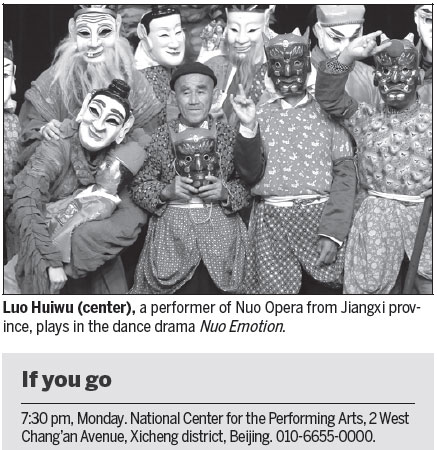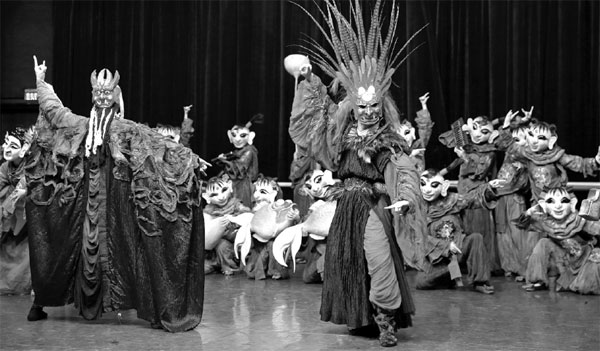The unmasking of Nuo
Updated: 2016-11-07 14:56
By Chen Nan(China Daily USA)
|
|||||||||
A Beijing dance show takes inspiration from a dying folk opera. Chen Nan reports.
In a rehearsal room of Beijing Dance Academy, which is full of young dancers, Luo Huiwu draws all the attention.
Luo, 77, walks slowly toward the center of a stage and starts chanting. The dancers behind him bow their heads and he does as well.
The ritual, which Luo has practiced for the past 50 years, is part of the new dance drama Nuo Emotion.
It will be staged in Beijing on Monday.
|
Nuo Emotion, produced by Beijing Dance Academy, combines contemporary dance moves with elements of ancient Nuo Opera. Photos by Zou Hong / China Daily |
The piece, which is being produced by the academy, combines contemporary dance moves with elements of Nuo - a popular folk opera in China's south and east.
Luo is from Shiyou, a village in Nanfeng county, Jiangxi province, where the Nanfeng Nuo Opera Troupe is based. He is the oldest performer in his troupe.
"In the beginning and at the end of a show, I sing the lyrics. They are prayers for good things, such as fortune, happiness and health. The singing is performed in an ancient Jiangxi dialect that doesn't have a written form," says Luo.
He started learning the opera in his early 20s.
"We also sing for the past Nuo performers, showing our gratitude to them for teaching us."
In the upcoming show, seven other members of his troupe will also perform.
Nuo was once widely performed in olden-day China when people wanted to pray for nature's mercy to stop disasters and the spread of diseases or for good harvests and longevity.
Originating in the 16th century as a form of totem worship, Nuo drew some references from Taoism later. Performers wear heavy costumes and thick masks that symbolize many gods.
Guo Lei, head of the Beijing Dance Academy, is directing the dance drama.
Also a native of Jiangxi, Guo grew up watching Nuo Opera.
"As a child I was scared of the masks. But as I grew older, it became fun to watch such performances," recalls Guo.
Many of the masks are made of wood.
In 2013, when Guo and the academy's dancers went to ArtsCross, a major annual intercultural project in London, they did a Nuo performance, which got good feedback from the audience.
"People kept on asking us what the masks are about and what the dances mean," says Guo. "Not just the audience, but also our young dancers - they are very curious about Nuo."
Many young Chinese don't know about this culture, mostly because it is dying today.
After the show in London, Guo took the students to his hometown to explain more about the opera.
In the past three years, they have visited Nanfeng a few times and spent months with the dancers of the Nanfeng Nuo Opera Troupe.
That's how the academy's association with Luo developed.
Guo says the folk tradition that has evolved over thousands of years has been passed down generations.
A Nuo performance can last for days with the practitioners telling folk tales through chants, songs or dance.
Nanfeng is known for Nuo dance. When the performers put on the masks, they don't talk or sing during dancing in reverence of the gods. The instruments accompanying the dance are drums and gongs.
The academy's dancers were amazed by the art form when they visited Shiyou village, says Wu Shuai, executive director of Nuo Emotion. All the villagers and people from nearby gathered at a temple, which was built in 1781 for the gods of Nuo. Some families had even invited the troupe to perform at their homes.
"We only have eight people in the troupe and we danced 24 hours during the Spring Festival," says troupe director and village head, Ye Genming.
The 49-year-old started to learn Nuo as a teenager. He says the tradition of inviting Nuo troupes to perform at people's homes goes back to the Ming Dynasty (1368-1644).
How to pass on the ancient tradition is a serious issue for Ye. When he first started as a Nuo performer in the 1980s, there were more than 100 Nuo troupes in Nanfeng. Only a few are left.
To save the old art, Ye opened a school to train young enthusiasts in 2006. It has trained 60 students.
"Fewer young people are learning it because they are more attracted to modern things," says Ye. "But we are still trying to preserve the culture of Nuo."
Contact the writer at chennan@chinadaily.com.cn

(China Daily USA 11/07/2016 page7)
Today's Top News
UK PM May promises EU exit 'in full'
Chinese dance drama stuns British audience
Latvia links with Belt and Road Initiative
High Court: Parliament must vote before Brexit
Li promotes SCO bank, free trade
Court to instruct how to trigger formal EU exit
Premier emphasizes fight against terror
Italian authorities vow to rebuild earthquake-hit areas
Hot Topics
Lunar probe , China growth forecasts, Emission rules get tougher, China seen through 'colored lens', International board,
Editor's Picks

|

|

|

|

|

|








